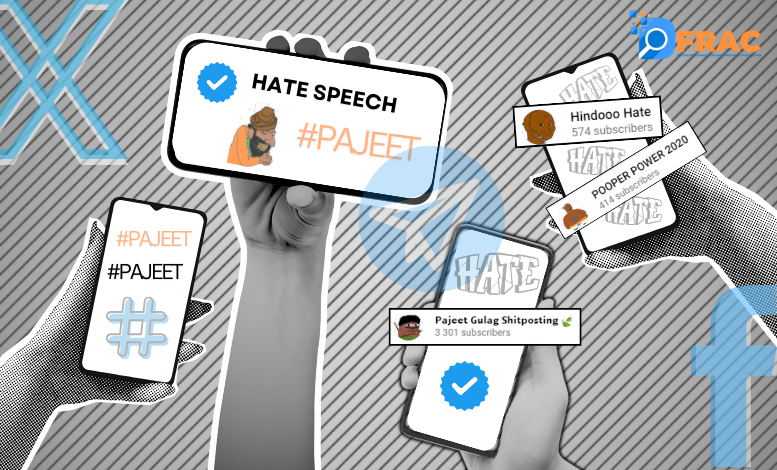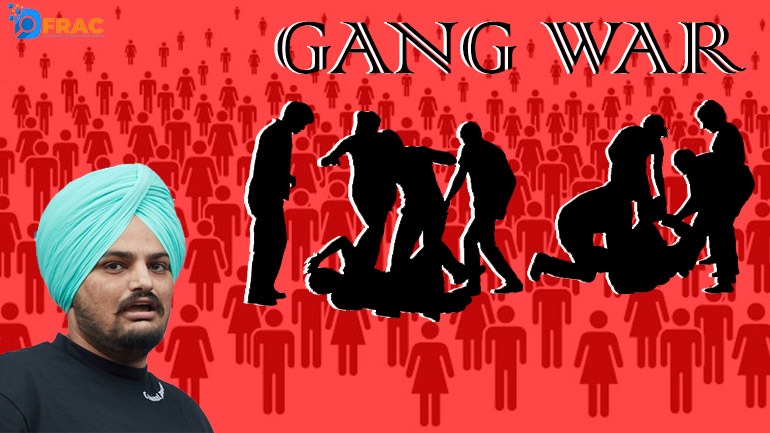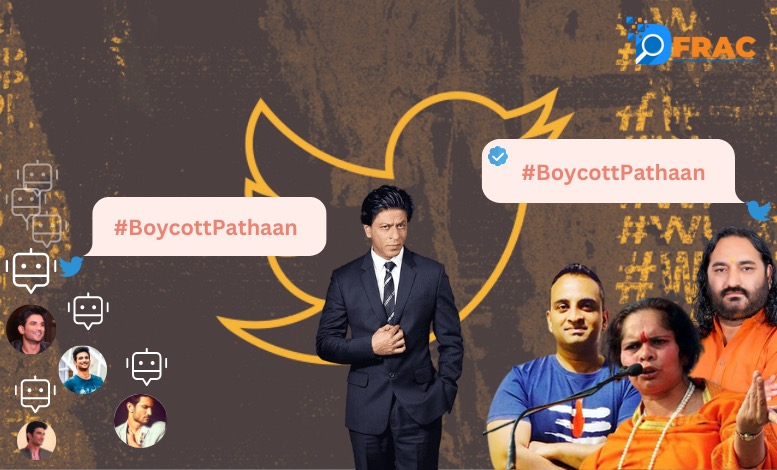In the vast expanse of cyberspace, speech flows with minimal restrictions, offering a seemingly utopian playground for the expression of ideas. However, this freedom often leads to the accrual of hate speech, particularly targeting identifiable groups. Our report delves into the realm of hate speech directed at Indian communities, aiming to dissect the lexicon used and its propagation across borders.
Motive: to incite divisive behaviour within the Indian diaspora.
Pajeets: Its Origin as Hinduphobic Slur
The derogatory term “Pajeet” emerges as a focal point in our analysis, serving as an ethno-religious slur predominantly aimed at Indians, particularly Hindus. Tracing its origins to a 2015 meme on 4chan, this term has since gained traction, reaching its zenith in 2024.
Where Does The Term ‘Pajeet’ Come From?
Originating as an invented term, “Pajeet” made its debut in a July 2015 meme on 4chan, a digital forum notorious for its anonymous image postings. This meme emerged as a notable spinoff from the popular “Mehmet, My Son” series, which humorously depicted a Turkish father urging his son to select a partner from either Turkey or the Balkans for marriage. In the twisted iteration of “Pajeet, My Son,” the comic strip takes a derogatory turn, mocking Indians and India itself, particularly regarding issues of open defecation.
From its humble beginnings in 2015, the term “Pajeet” has experienced exponential growth, culminating in its peak prevalence in the year 2024.

The Evolution of Hate Speech: Tracking Patterns and Trends
Through a meticulous examination of Twitter, Telegram, and Facebook, platforms known for their lax content moderation, we observed a disturbing surge in hate speech. The term “Pajeet,” often coupled with derogatory language and imagery, proliferates across these platforms, presenting Indians in a degrading light.
This platform serves as a hotbed for hate speech in various forms: text, memes, and videos. Not confined to specific formats, hate speech proliferates across online discussions, social media posts, and hashtags with alarming frequency. What’s particularly disturbing is the accompanying use of Hindu symbols such as the swastika or forehead markings. Hinduphobic terms like “cow piss drinker,” “dung worshipper,” and “kaffir” are liberally deployed, perpetuating stereotypes that depict Indians as backward, dirty, and unintelligent. Furthermore, Violent language and imagery intensify the toxicity, while Hindu-specific symbols like tilaks and bindis amplify the hate.
Timeline of the hashtag
We analyzed the data of the hashtag #Pajeet from the period of Jan 2022 to Feb 2024. We noticed that the timeline was low initially with over 2-3 tweets every month. It was noticed that the trend started rising on 9th Jan 2024 with over 25 tweets a day, and the trend noticed a peak on 30th Jan 2024 with over 40 tweets done in a single day.

It can be observed that the trend is increasing with time. Focusing from Jan 9th to 3rd March 2024, the number of tweets has increased over time.

The uptick in hashtags began in January, coinciding with an alarming increase in newly created accounts dedicated purely to circulating ‘Pajeet’ content. Disturbingly, our findings revealed that these accounts were created in large numbers throughout January and February 2024, indicating a coordinated attempt to amplify and promote hostile narratives.
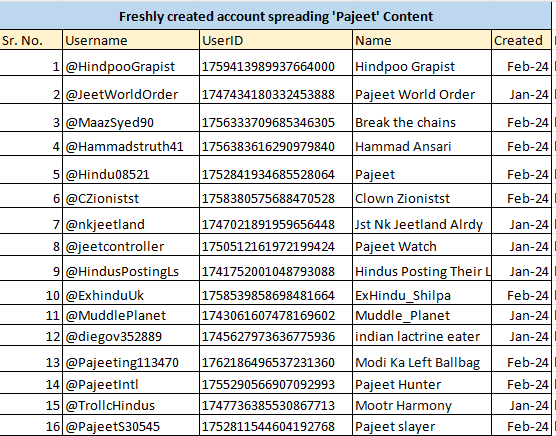
Yearly Tweets
Our yearly tweet analysis provided a comprehensive overview of tweet proportions from 2022 to 2024. Notably, in 2024 (Jan-Feb), tweets surged to over 60%, a stark increase compared to 2023 and 2022. Specifically, there were 563 tweets on #Pajeet in 2024, 334 tweets in 2023, and merely 37 tweets in 2022. This trend accentuates a consistent rise in the usage of this term each year.

Who’s Leading the Charge?
Verified accounts, often wielding considerable influence, emerge as key purveyors of hate speech.
Two prominent accounts that have taken center stage in spreading hate speech are Crime Reports India (@AsianDigest) and Owen Benjamin (@OwenBenjamin). The worrying part is that when these verified users spread hate, it quickly reaches their large audience, resulting in a significant impact.
Upon analyzing the accounts with the highest tweet frequency over the years, it became evident that Crime Reports India (@AsianDigest) topped the list with over 60 tweets. Following closely behind are Faizan Wani (@_Caged_) with 42 tweets, Love Ranger (@LoveRanger410) with 38 tweets, Owen Benjamin (@OwenBenjamin) with 36 tweets, Lost Soul MD (@LostSoulNYC1982) with 32 tweets, and Saar (@PajeetSaar) with 30 tweets, among others.
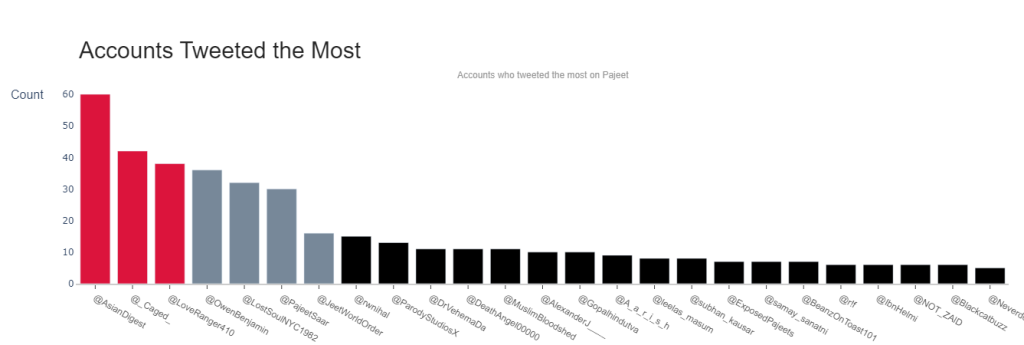
Crime Report India
This account wears the cloak of reporting, yet it’s merely a wolf in sheep’s clothing, peddling hate speech against Hindus and Indians under the guise of journalism. It consistently employs this term whenever Hindus are mentioned, even extending the derogatory labelling to notable individuals like Rishi Sunak of Indian origin. Additionally, it resorts to comparing Hindus to derogatory stereotypes such as cow-eaters and urine drinkers and doesn’t hesitate to target even Jainism priests.
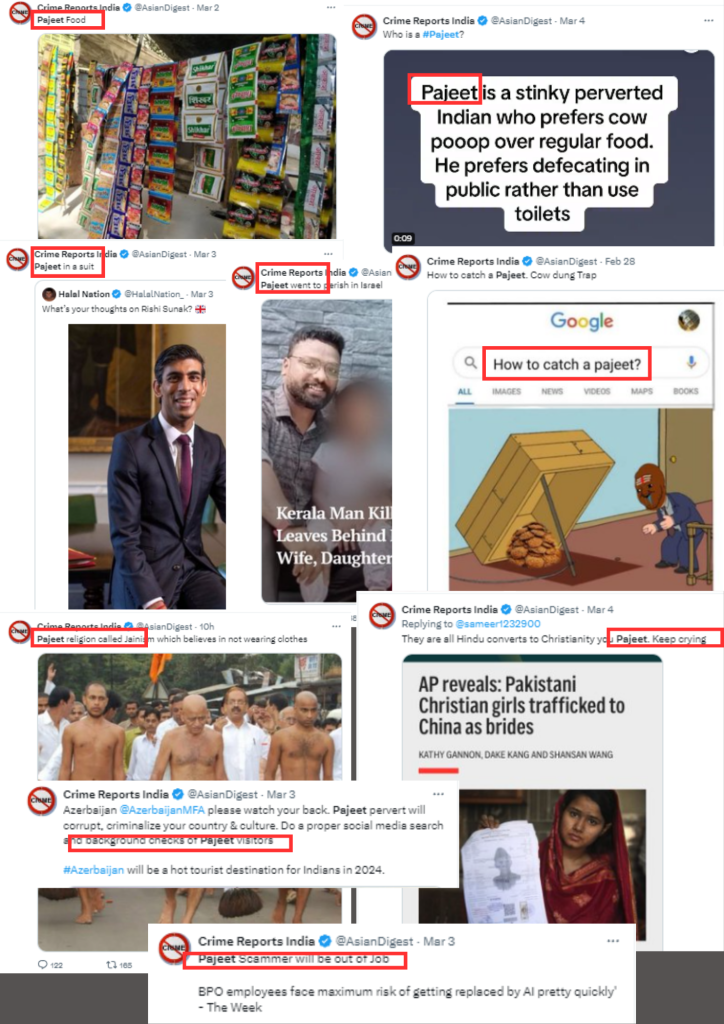
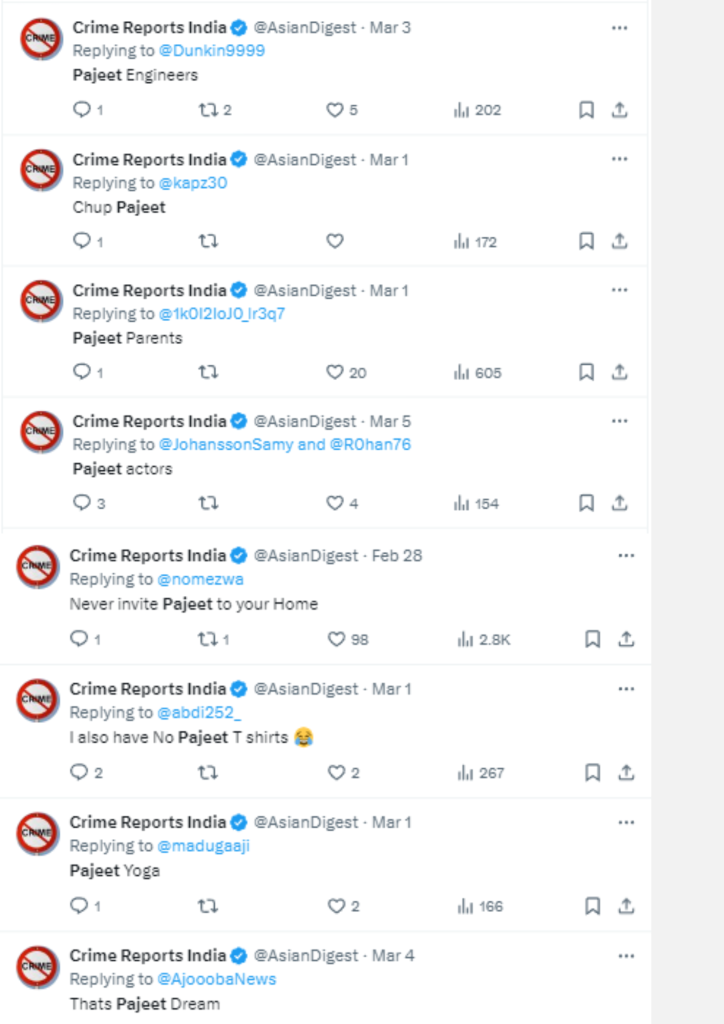
Fig 7. This image shows comments made by this account using the term to push hate into the minds of the audience.
Besides this hate speech, another favourite task of this account is to spread fake and misleading News about India. Multiple fact checks and a detailed report on this account are available on our website.
Owen Benjamin
Owen Benjamin, also known as Owen Smith, is a former mainstream comedian and actor who has veered into disseminating antisemitic content since 2018. He has 237.2k followers (yes quite a massive audience to consume his hatred). He is found to share racist and hate comments about Hindus and Indians referring to them as Pajeets.
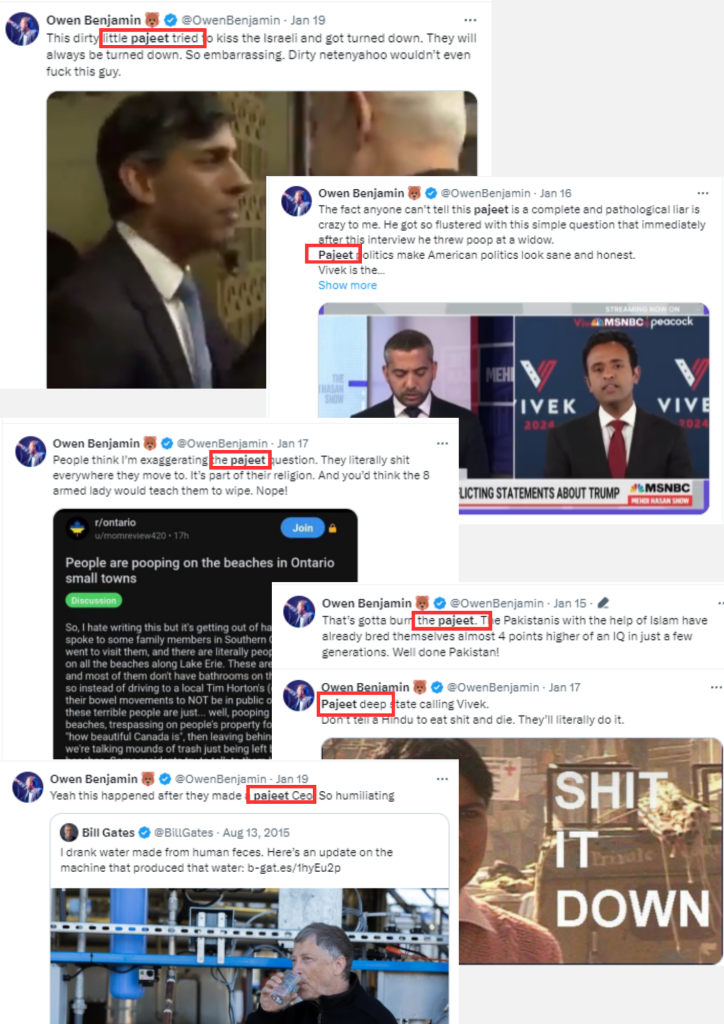
Maldivian Hate Speech
Since the election of a new president in the Maldives, Mohamed Muizzu, the relationship with New Delhi has experienced a downturn. Observing the turn of these events, “Pajeet” was used by accounts running from Maldives. The term was used the maximum in Jan 2024 surrounding the event and it achieved the peak on 15 Jan 2024

Majorly these accounts used hashtags like #Indiaout and #Savemaldives.
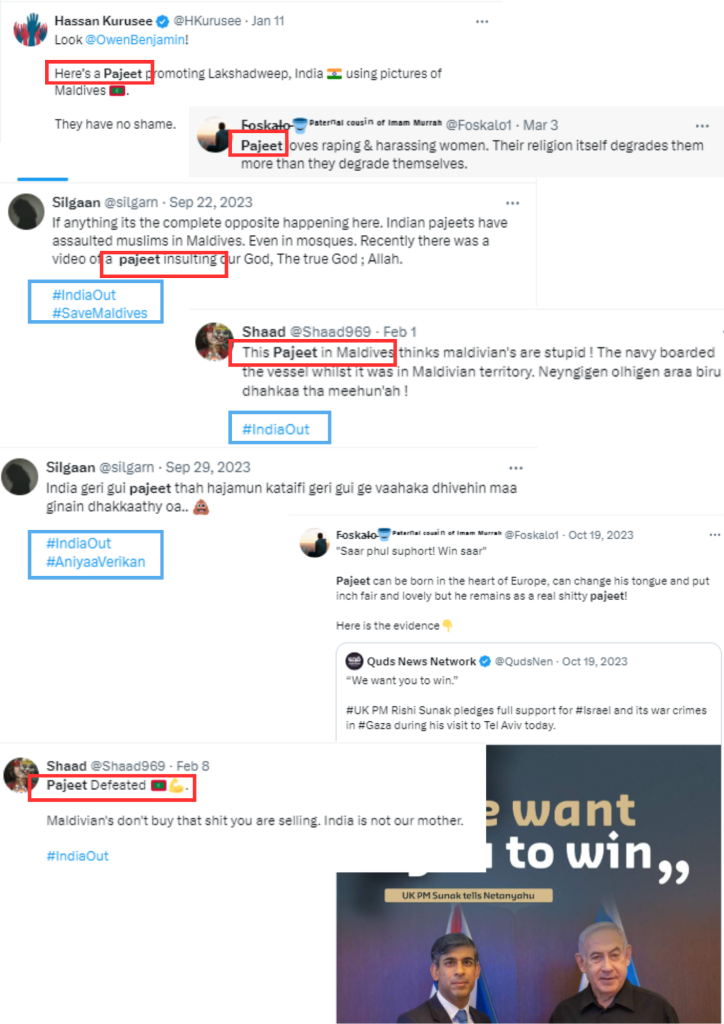
Strikingly, a Former member of the Maldivian Parliament (People’s Majlis, May 2009 -May 2019), Ahmed Nihan was also found using the term to degenerate the Indians.
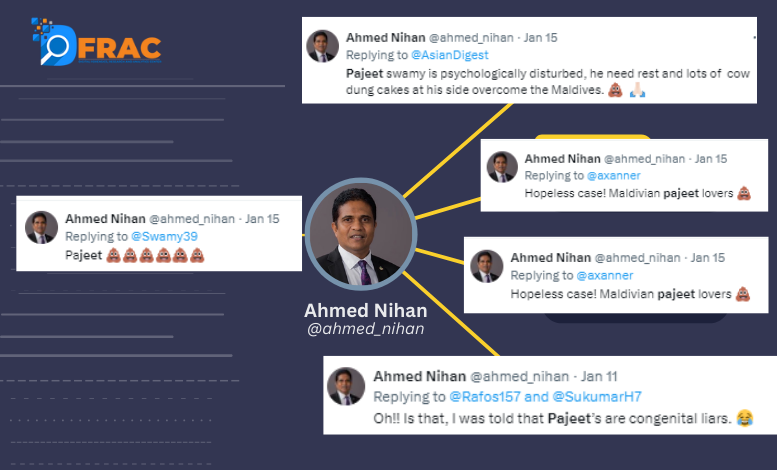
Wordcloud
We analyzed the words used with the hashtag #Pajeet, it was found that the “Indian” word was mostly used with the hashtag #Pajeet. Moreover, words like “Cow”, “urine”, “Hindu”, “Muslim”, “Israel”, “Dirty”, “Gobar”, etc.

Decoding the Lexicon: From Memes to Misinformation
Hate speech manifests not only through textual content but also via memes and AI-generated materials. The creative packaging of hateful messages, often masked in humor, poses a significant challenge for content moderation efforts.
Telegram
Telegram, known for its lax content moderation, has become a sanctuary for extreme groups across the ideological spectrum. Anti-Hindu hate speech thrives here under the pretext of ethnic pejoratives, slurs, and coded language, which fanatics continue to spread with increasing impunity.
The platform’s landscape is dominated by memes, a seemingly innocuous medium hijacked by hate-mongers to spread their toxic rhetoric. Through meme culture and twisted humor, these individuals cloak their hateful messages, cunningly evading detection and attracting unsuspecting audiences. What’s particularly insidious is the packaging of these memes, designed to spawn alternate versions and offshoots like “poopjeet,” “cow urine drinker,” “saarr,” and “pazeet.” These variations not only perpetuate derogatory stereotypes but also amplify the spread of hate across multiple platforms. The accounts responsible for this onslaught are often brazenly named “Pajeet,” accompanied by terms like “shitpostings” and “poop,” reflecting the depths of depravity.
The most recent account, “World Pazeet stickers,” was launched on February 26 and has only one goal: to distribute offensive stickers ridiculing the Indian population. The stickers and GIFs published on the account are easily shareable across other social media sites.


Another account named ‘Pooper Power 2020’ was created on 30 March 2019. Earlier the account shared pornographic content, which gained him subscribers, then later in September 2019, the account started to share Hinduphobic content.

The number of Subscribers consuming the hate on Telegram even crosses 3000 on some Telegram channels.
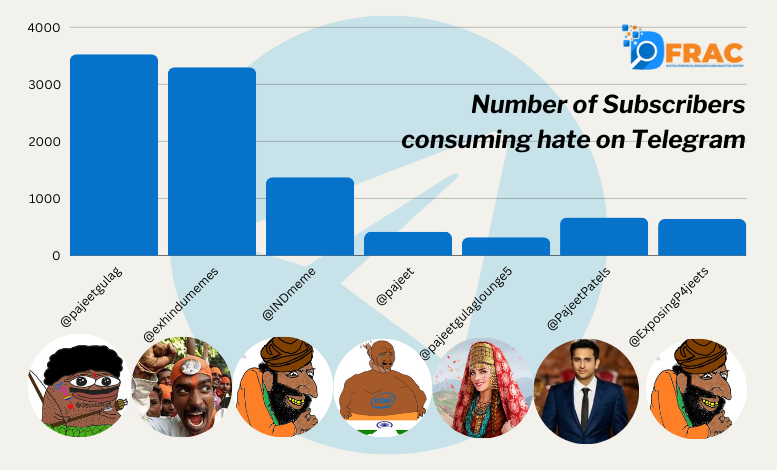
Besides Twitter and Telegram, Facebook also saw a wave of hate speech for Hindus and Indians. We identified multiple groups and Pages, all majorly running from Bangladesh.
A public group named 8kb of 1440p memes: Seckso Zero Edition has 114.9k followers. The Bio and the profile picture resemble any gamer Page but have much mockery and hateful content. Although the group identifies from Nigeria, the accounts sharing “Pajeet” content majorly belonged to Bangladesh.
Muhammad Eyasin Arafat, an active user on this page, has been sharing hateful posts. Additionally, he administers a page called “Cringe Pajeet (Where All �Indians will be Triggered)” created on November 3, 2023. The account exclusively shares pictures, videos, and memes targeting the Indian community, referring to India as ‘Bindia’ and Indians as ‘Bindians.’ It’s noteworthy that the admin himself is from Bangladesh.
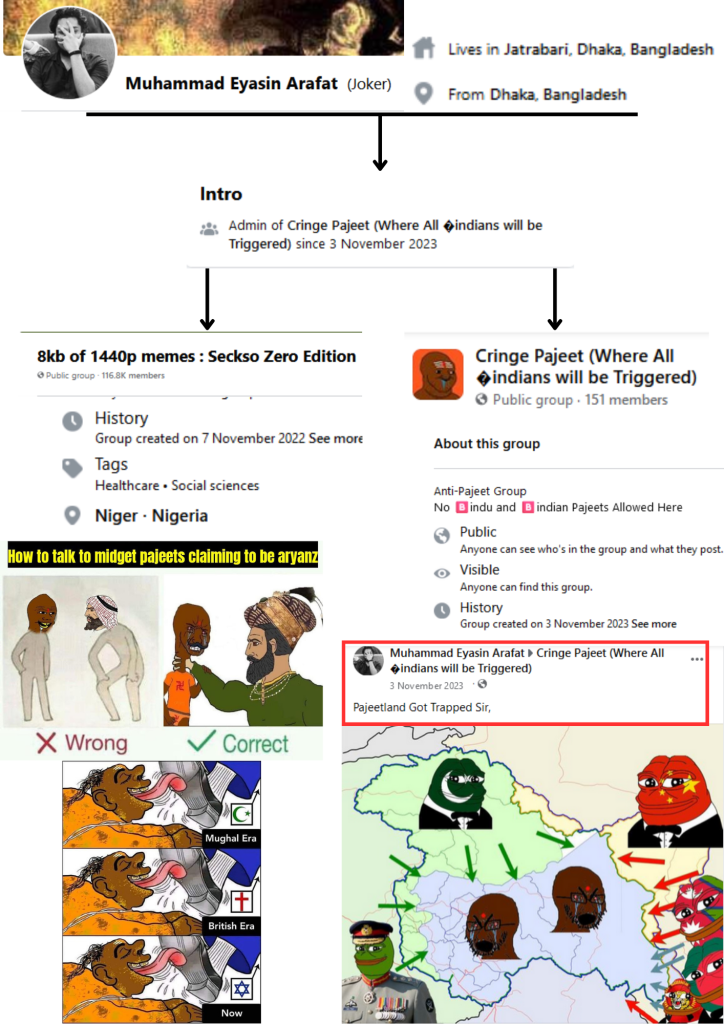
Several accounts emerged during our investigation, in which various groups and individuals have been identified as disseminators of hostile content, with origins traceable back to Bangladesh. The toxic rhetoric has crossed boundaries, penetrating groups beyond its inception.
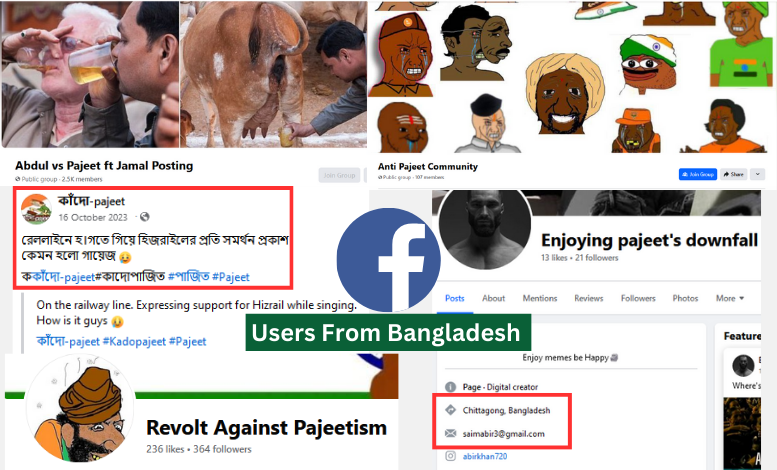
The Rise of AI in Spreading Hate
At first glance, it resembles a promotional poster for a Pixar film. However, the title of the movie depicted is “Pajeet.” The predominant focus of major AI-generated images centers on two elements: faeces and individuals of Indian descent.


The advent of AI-generated hate content adds a new dimension to the propagation of extremist ideologies. The spread of Hinduphobic content isn’t confined to memes, text, or videos; it has also infiltrated social media through the misuse of AI. While recent advancements in AI are promising, a troubling trend has emerged: the creation of images embedded with subtle hate messages. This poses a significant challenge for content moderation efforts, complicating the task of combating online extremism. The themes targeted were the Hindu gods, Israel Hamas Conflict, Foreigners visiting India, and UNICEF’s “POO in the LOO” initiative.

Malicious individuals aren’t producing these materials for mere amusement. Instead, they’re employing humor strategically to render hate more palatable and attractive to a broader audience. Subliminal messaging has the potential to normalize extremist perspectives and ideologies, drawing in individuals who would otherwise reject overt expressions of hate speech.
Conclusion: Towards a Safer Cyberspace
Understanding the distinction between humour and hate is crucial. However, when this line blurs, it fosters the emergence of hate speech. The derogatory term “Pajeet” has emerged as a focal point of this hate speech, originating from a 2015 meme on 4chan and gaining traction over the years. Our analysis has revealed the alarming surge of hate speech across platforms like Twitter, Telegram, and Facebook, often coupled with derogatory language and imagery. The propagation of hate speech, disguised under the veil of humor, has normalized extremist ideologies and attracted individuals who might otherwise reject overt expressions of hate. The themes targeted, ranging from Hindu gods to geopolitical conflicts, reflect the insidious nature of online hate speech.


